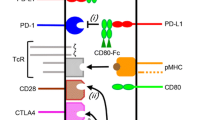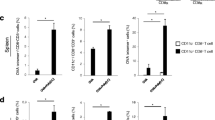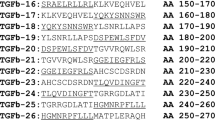Abstract
Engagement of CD40 on the surface of antigen-presenting cells (APC) has been shown to substitute for T cell help in activating APC to stimulate cytotoxic T lymphocytes (CTL). We explored whether this powerful non-specific signal could enhance the CTL response to a self epitope from a tumor-associated antigen. We immunized mice with a lipopeptide covering the H-2Kd-restricted epitope, amino acids 232–240 of murine wild-type p53, followed by treatment with an activating anti-CD40 monoclonal antibody. Anti-CD40 antibody, given subcutaneously or intravenously, significantly enhanced effector activity against targets pulsed with non-lipidated 232–240 nonamer epitope peptide, as assessed both by a CTL lysis assay and an enzyme-linked immunospot (ELISPOT) assay for interferon-γ-secreting cells. However, despite this enhancement, we could not detect activity against targets expressing p53 endogenously by either assay. This most likely reflects the low avidity of the effectors as determined by a titration of peptide on the target cells. The implications of this work for cancer immunotherapy based on specific responses directed against tumor-associated antigens are discussed.
Similar content being viewed by others
Author information
Authors and Affiliations
Additional information
Received: 28 March 2000 / Accepted: 6 June 2000
Rights and permissions
About this article
Cite this article
Erdile, L., Smith, D. CD40 activation enhances the magnitude of cellular immune responses against p53 but not the avidity of the effectors. Cancer Immunol Immunother 49, 410–416 (2000). https://doi.org/10.1007/s002620000135
Issue Date:
DOI: https://doi.org/10.1007/s002620000135




